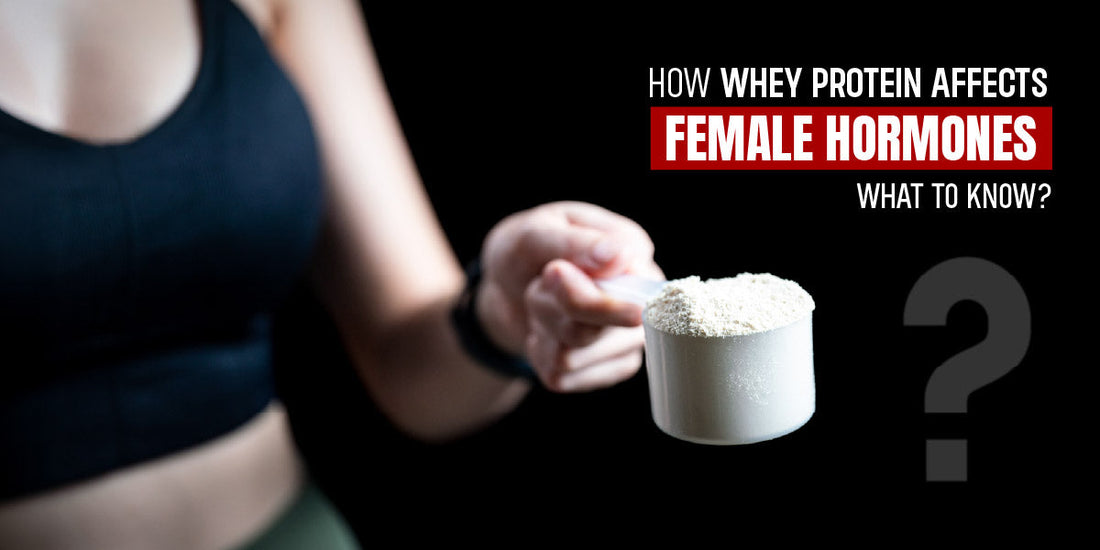
How Whey Protein Affects Female Hormones: What Every Woman Should Know
byWhey protein has long been celebrated for its muscle-building and recovery-enhancing properties. But for women, there's often a lingering question: "Will whey protein affect my hormones?" This concern is legitimate—hormones are essential in influencing various aspects, including mood, energy levels, menstrual health, and fertility. In this article, we’ll explore how whey protein interacts with female hormones, break common myths, and highlight what every woman should know before adding whey to her diet.
What Is Whey Protein?
Whey protein is a high-quality, complete protein derived from milk, which is obtained as a byproduct during the cheese-making process. It contains all nine essential amino acids and is rapidly absorbed by the body, making it a popular choice among athletes and health-conscious individuals.
It typically comes in three forms:
- Whey Protein Concentrate (WPC)
- Whey Protein Isolate (WPI)
- Whey Protein Hydrolysate (WPH)
Each varies slightly in processing and lactose content, but all provide a strong amino acid profile that supports lean muscle development and recovery.
Common Myths About Whey and Female Hormones
❌ Myth 1: Whey protein causes hormonal imbalance.
✅ Fact: There is no evidence that moderate whey protein intake causes hormonal imbalance in healthy women. It does not contain hormones that disrupt the female endocrine system.
❌ Myth 2: Whey protein increases testosterone in women.
✅ Fact: Whey protein itself does not raise testosterone levels in women. The idea likely stems from confusion around muscle growth, which is often associated with testosterone. However, muscle gain from whey is driven by its amino acid content, not hormone alteration.
❌ Myth 3: Whey protein could potentially affect the menstrual cycle.
✅ Fact: There is no scientific evidence linking whey protein intake to irregular periods or menstrual dysfunction. However, very high protein diets or extreme caloric deficits can impact cycles—not the protein source itself.
How Whey Protein Actually Supports Female Hormonal Health
1. Supports Blood Sugar Stability
Whey protein, when ingested alongside carbohydrates, reduces the rate of glucose absorption, thereby assisting in the prevention of fluctuations and drops in blood sugar levels. This can benefit insulin sensitivity, which is closely linked to PCOS (Polycystic Ovary Syndrome) and estrogen balance.
2. Aids in Weight Management
Healthy body weight supports hormone regulation. Whey protein promotes satiety, reduces hunger hormones like ghrelin, and helps preserve lean muscle during weight loss. This is crucial for maintaining estrogen levels, which are often stored and regulated in fat tissue.
3. Supports Muscle Maintenance in Menopausal Women
As estrogen declines during menopause, women naturally lose muscle mass and bone density. Whey protein can help counteract this loss when combined with resistance training—improving strength, metabolism, and overall hormonal balance.
4. Contains Bioactive Peptides
Whey contains bioactive compounds that have antioxidant and anti-inflammatory effects. These can indirectly support endocrine function and reduce chronic stress on the body—important for maintaining healthy cortisol and thyroid levels.
When Could Whey Protein Be a Concern?
Whey protein is derived from milk, so if you are:
- Lactose intolerant
- Allergic to dairy
- Dealing with specific hormonal conditions (like estrogen-sensitive cancers)
…you may want to consult your healthcare provider before consuming whey or opt for plant-based protein alternatives like pea, rice, or soy.
Tips for Women Taking Whey Protein
✅ Stick to recommended serving sizes (20–30g per serving).
✅ Choose clean-label brands with no added sugars or synthetic hormones.
✅ Pair protein intake with strength training for best results.
✅ Ensure your overall diet is balanced with healthy fats and complex carbs.
Final Thoughts
Whey protein is not a hormonal disruptor—it’s a nutritional ally. When taken in moderation and as part of a healthy diet, it supports female hormone balance, muscle recovery, and weight management.
Whether you're looking to improve your fitness, manage PCOS, or stay strong through menopause, whey protein can be a safe and effective tool—as long as it complements your lifestyle and health goals.








